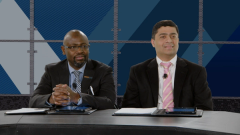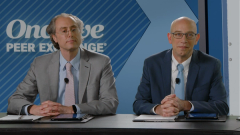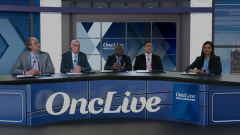
Frontline Therapy for SCLC: The CASPIAN Trial of Durvalumab + Chemotherapy
Jared Weiss, MD, reviews data from the CASPIAN trial of durvalumab plus chemotherapy in patients with extensive-stage small cell lung cancer.
Episodes in this series

Charu Aggarwal, MD, MPH: Jared, could you walk us through the Caspian trial?
Jared Weiss, MD: The Caspian trial was a randomized phase 3 study enrolling patients with extensive-stage small-cell lung cancer. Interestingly, on this study, patients were allowed to have treated or asymptomatic small brain metastases. There is stratification by choice of platinum agents’ platinum or carboplatin and patients were randomized into 3 arms, either carboplatin and etoposide alone, carboplatin etoposide, plus the PDL one inhibitor durvalumab or carboplatin plus etoposide plus durvalumab plus the CTLA-4 inhibitor tremelimumab.
Charu Aggarwal, MD, MPH: Could you say what the clinical implications of this clinical trial are and tell us how you use the results of this trial in practice?
Jared Weiss, MD: Sure. As Taofeek mentioned, it was almost a 30% improvement in survival hazard ratio of 0.71, for those who like the medians, they were 12.9 versus 10 and a half months because like Taofeek, in hazard ratios and I'm not smart enough to memorize all of these, but importantly, another number I've written down here that I think is really important for understanding the human benefits of this therapy is the 3-year survival that we just got I believe at ESMO, [European Society of Medical Oncology] that was 17.6% versus 5.8%. And that's something to pause and reflect on because that's what our patients want. They don't want another 2 months in survival. What they want is some chance of being alive to their daughters or granddaughter's wedding or landmarks. And that's remarkable more than 17% of patients alive at 3 years with extensive stage small cell lung cancer. And in further reflecting on this, an obvious question is at what cost, right? Because in the historic developments in cancer, we are infamous in the medical world for the toxicities of our treatments, but this was not a cytotoxic agent, the overall toxicity profile of platinum etoposide alone, as compared to platinum etopo durva was more similar than different. Of course, you had the expected immune related adverse events, very similar to other cancers. But when I first saw that data, I was perhaps impressed by the greater similarity between the arms. It was not a large toxicity cost in exchange for that chance of 3-year survival.
Charu Aggarwal, MD, MPH: When we saw that data, it was very reassuring to see that that benefit persists that we are not seeing a different signal. It just validated our treatment choices that we make for our patients. Taofeek, are there any clinical factors that may predict long term survival in patients receiving chemotherapy immunotherapy?
Taofeek Owonikoko, MD, PhD: If we look at the result of the 2 major studies performed in the US [United States] and globally for that matter, we know that when you add immunotherapy to chemotherapy the likelihood of someone being a long term survivor as defining the trial, which just the people in tail of the curve, is almost 3 to 4 times. You have 3 to 4 times more likely to be a long-time survivor than if you only got chemotherapy. We know that that is the outcome. How you got there is what we currently don't know. Why is it that when you add immunotherapy to chemotherapy, you are more likely to be a long-term survivor? We do not understand that biology very well. A group, did some work looking at tissue samples from the empower 133 trial, where they looked at gene expression, profiling, immune infiltered, and everything else. There doesn't seem to be a smoking gun that you can go after and say, this is what I'm going to look for, but we do know that this patient, it's not based on the clinical factors that we all can point to. It's not based on gender. It's not based on age, but certain things do associate with those patients who are likely to benefit and be long term survivors. They tend to be people who completed the duration of treatment planned with chemotherapy and immunotherapy and in general, they had more treatment than those who were not long-term survivor, but that's a chicken and egg thing. Is it, you got more treatment because you were a long-term survivor is, or it because the treatment that made you long term survivor? It's difficult to tease that apart, but regardless of how they got there, we know that there's this subset of patients that then to do well when you add immunotherapy to chemotherapy. And we saw that with durvalumab, now with the study that Dr Rudin was part of that was presented at AACR [American Association for Cancer Research] this year, as well as with the empower 133 of atezolizumab that about 20% of our patient treated with immunotherapy and chemotherapy. They are this long-term survival. We just have to then understand who they are before we start the treatment and hopefully that will guide us better to select patient and reach for the benefit.
Charles Rudin, MD, PhD: Taofeek is too modest. He himself has done interesting studies trying to define that population and the markers that Vivek pointed out earlier that ASCL one neuro done 2, 3, there's a 4th subset that lacks any of those 3 that is enriched for those responders to immunotherapy and Taofeek among others really helped to define that and nail that down. It is still a very active area of investigation, but he's certainly been one of the people to help really sort that out.
Jared Weiss, MD: Bring it back to clinical standard of care. The key thing to remember for community audience is that PDL one should not be a selection factor here. It just doesn't work.
Charu Aggarwal, MD, MPH: That's a really good point.
Transcript edited for clarity.








































